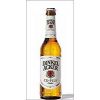Brauerei Dinkelacker - CD-Pils
-
ABV:
5.00% -
Serving Temperature:
48° F

The German zeal for beer is legendary. You needn’t be a beer connoisseur to be familiar with this fact. Aficionado or novice, you’ve no doubt encountered the terms Bavaria and Oktoberfest, two words that have made their way onto many a beer label. Bavaria is, of course, the German heartland of beer brewing and drinking. If you read last month’s newsletter, you may have been surprised to find out that The Czech Republic, not Germany, ranks #1 on the list of international per capita beer consumption. The Czechs unseated the Germans after the split of Czechoslovakia, primarily because the Slovaks prefer wine over beer and had been bringing down the national beer drinking average. If Bavaria were to secede from Germany, they’d almost certainly be the new world champions. But while Germany no longer holds this esteemed rank, it still produces the most beer per capita. True, the USA still produces the most beer by total volume, but Germany brews the most per citizen. However, the Germans have a valid argument available to them if they ever choose to dispute this fact; according to the German Purity Law of 1516, the Reinheitsgebot, which originated in Bavaria, beer may only contain the following four ingredients: water, malted barley, hops and yeast (though a special amendment to the law was granted to permit the brewing of Southern Germany’s famed wit, or wheat beers). Most of the commercial beer giants in the USA are brewed not with pure malted barley, but with cheaper adjuncts such as corn and rice, in combination with malted barley, as a cost-cutting measure. So, per German standards, USA brews such as Budweiser and Miller cannot truly be defined as beer. But, since you’re a member of our club, you’ve probably shared this belief for some time—and we’re only too happy to confirm your suspicions.
As we mentioned, Oktoberfest has become a widely circulated term, synonymous with high-quality German beer and brew drinking enthusiasm. The Oktoberfest celebrations began in Munich in 1810 to honor the Bavarian Queen Theresia (wife of King Ludwig). Originally a country fair, Oktoberfest has grown to draw worldwide patronage. The primary rival to the Oktoberfest is the autumn fair of Stuttgart, held in the riverside district of Cannstatt. This event was started in 1818 by the King of Württemberg. Our first featured beer comes to us from Stuttgart, the capital of Baden-Württemberg, Germany’s largest southwestern state. Brauerei Dinkelacker was founded by Carl Dinkelacker in 1888. His contemporaries were probably not surprised to witness his foray into the brewing business; Dinkel is the German word for spelt, an early form of wheat (often used in beers of southern Germany) and Acker is German for field. So with a name like “Carl Wheatfield”, what else could the man do (besides farming)? And while the brewery was founded in 1888, records dating back as far as the 1500s allude to brewing in the region by the Dinkelacker family.
Coincident with the industrial revolution that swept the world in the early 1900s, Brauerei Dinkelacker also underwent major technological changes. A consequence of industrialization was a population boom in metropolitan areas. More people meant more workers, which in turn fueled technological advancement, but also required implementation of automation in the brewing process in order to satisfy the demand of the ever-swelling population. Thus, as industrialization begat industrialization in Stuttgart, Dinkelacker added automated brewing and bottling components in 1903. The following sixty years saw unprecedented growth for the brewery as they gained international appeal. In 1963, major technological updates were again performed at the brewery. Because of their reputation of constantly being on the forward cusp of brewing technology since their beginnings in the late 1800s, Founder Carl Dinkelacker is regarded by many to be the father of the modern day brewery. Their current brewery is considered one of the most modern and environmentally friendly in the world.
If you’d like more information about Brauerei Dinkelacker (and can read German) check out http://www.dinkelacker.de.

Unmatched Variety by style, brewery & country
Choose from Five different Beer Clubs offering unmatched variety by brewery,
country of origin, and beer style to suit your specific tastes.


